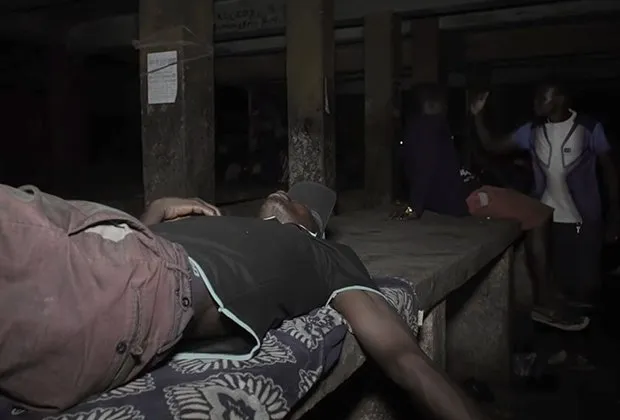A state of emergency has been declared in Sierra Leone because of a drug made of bones
Sierra Leone has declared a state of emergency over kush, a drug made from synthetic cannabinoids and human bones. It is very cheap, even by the standards of the poor African country, and yet it is quickly addictive. Those addicted to kush can be easily spotted on the streets of Freetown, the capital of Sierra Leone. They waddle aimlessly in circles like zombies, slouching and bowing their heads to the side. Many of them have swollen arms and legs from infections.
Sierra Leone’s president has called kush a threat to the country’s very existence
In a televised address to the nation, Sierra Leone’s President Julius Maada Bio said the existential threat that drug addiction posed to the country. A particular danger, he says, is kush. He claims that the number of deaths caused by its use is skyrocketing.
There are no official statistics on the number of casualties among kush users in Sierra Leone. An anonymous doctor in Freetown told BBC News that hundreds of deaths linked to addiction to the drug have been recorded in the city in recent months.
“1865 people have been admitted to Sierra Leone’s only mental hospital after using kush.“
The number of kush users admitted to Sierra Leone’s psychiatric hospital, the country’s only psychiatric care facility, has also increased steadily. Its management estimates that 63 per cent of recent hospitalizations have been linked in one way or another to kush use.
The President of Sierra Leone proposed the establishment of a rehabilitation center in every district of the country to treat kush users. The first one was hastily opened at the beginning of the year on the basis of the army training center in Freetown. Experts have serious doubts about its effectiveness: so far, people who go there are not so much treated as isolated.
Under the influence of kush, people spend whole days in a state that makes them look like zombies
According to authorities, Kush appeared in Sierra Leone about four years ago. “Kush has become the new king, displacing more expensive drugs such as tramadol,” claims local documentary filmmaker Tyson Conte. According to him, the drug has taken over all segments of the population. Both men and women, the poor and the rich take it. Conte admits that even among his acquaintances, people who do not use kush are in a distinct minority.
The extraordinary popularity of kush is due to its cheapness. According to Kenye Barley, Sierra Leone’s Minister of Planning and Economic Development, it is the most affordable drug on the market. One dose costs about five leones, which is only two pennies. Although a person addicted to kush may need up to 40 doses in a day, this is still a manageable expenditure, even for a poor African country.
Under the influence of kush, people fall into a kind of trance: they disconnect from the real world, but they do not fall asleep and can continue to move. Mohamed, a Freetown garbage collector, told a correspondent for Agence France-Presse that the dose lasts for an hour at most. Then he wakes up, eats, and then takes the next one. Most of the day passes in a drug-induced stupor. It costs him 200 leones a day.
Under the influence of kush people do not control themselves and are capable of causing harm to themselves and others. A BBC News documentary about kush shows footage of a man in a state of drug intoxication trying to slit his own throat. Crime is also on the rise: the need to make a buck often drives people to theft or robbery. Many addicts scavenge through garbage dumps and sewage drains to find things to sell.
Kush is laced with powder made from human bones stolen from cemeteries
No one knows the exact composition of kush, except perhaps the people who make it – and even then not always, as the recipe changes frequently. “The drug is a mixture of various chemicals and plants that mimic the natural tetrahydrocannabinol found in marijuana,” says Abdul Sheku Kargbo, head of Sierra Leone’s National Drug Control Agency.
The base of kush is often referred to as synthetic k2 cannabinods. It may also contain the opioids fentanyl and tramadol, which are smuggled into Sierra Leone from China and other Asian countries. According to some reports, kush is diluted with acetone or formaldehyde, a substance used for embalming the dead and preserving anatomical preparations. In certain quantities, it can cause hallucinations.
“You know, it’s a constantly changing phenomenon. First they said they put formalin in it. Before you know it, there’s something else. The last substance that was added was human bones.”
Jusu Mattia is a doctor from Sierra Leone.
The most exotic ingredient rumored to be present in the kush is human bones. Freetown-based doctor Jusu Mattia suggests that the drug utilizes the sulfur they contain. According to another explanation, if the deceased abused drugs during his lifetime, they may have been deposited in his remains.
Both versions seem unlikely to experts, but that does not make the problem go away. An employee of the cemetery in Freetown showed a correspondent of the British TV channel Channel 4 several graves that could not be saved. The kidnappers took only the remains, without touching the coffin and everything else. And there are hundreds, if not thousands, of such cases, if he is to be believed.
Last August, the local press reported the arrest of four men who were digging up graves in search of bones for kush. And this year, authorities have had to go further and tighten security at the cemeteries. Otherwise, the looting of graves could not be stopped.
The problem affects not only in Sierra Leone, but also neighboring countries – in particular, Guinea and Liberia. Nigerian sociologist Feyi Ogunade does not rule out that the situation there is even more complicated, but it goes unnoticed because no one is monitoring the smuggling of kush. “I suspect it will soon spread to other countries unless the authorities do something about it,” he says. – And it seems to me they are unlikely to do so.”















